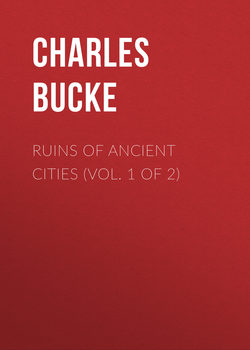Читать книгу Ruins of Ancient Cities (Vol. 1 of 2) - Charles Bucke - Страница 15
NO. XIII. – ARSINOE
ОглавлениеArsinoe was situated near the lake of Mœris, on the west shore of the Nile, where the inhabitants paid the highest veneration to crocodiles. They nourished them in a splendid manner, embalmed them after they were dead, and buried them in the subterranean cells of the Labyrinth; thence the city was called, in ancient times, Crocodilopolis43. When the Greeks conquered Egypt they altered its name to Arsinoe.
This name it retained in the time of Adrian, and Greek medals were struck here in honour of that emperor as well as of Trajan. Its ruins are thus described by Belzoni: – "On the morning of the 7th I went to see the ruins of the ancient Arsinoe; it had been a very large city, but nothing of it remains except high mounds of all sorts of rubbish. The chief materials appear to have been burnt bricks. There were many stone edifices, and a great quantity of wrought granite. In the present town of Medinet I observed several fragments of granite columns and other pieces of sculpture, of a most magnificent taste. It is certainly strange that granite columns are only to be seen in this place and near the Pyramids, six miles distant. Among the ruins at Arsinoe I also observed various fragments of statues of granite, well executed, but much mutilated; and it is my opinion that this town has been destroyed by violence and fire. It is clearly seen that the new town of Medinet is built out of the old town of Arsinoe, as the fragments are to be met with in every part of the town. The large blocks of stone have been diminished in their sizes, but enough is left to show the purposes for which they originally served. About the centre of the ruins I made an excavation in an ancient reservoir, which I found to be as deep as the bottom of the Bahr-Yousef, and which was, no doubt, filled at the time of the inundation, for the accommodation of the town. There are other similar wells in these ruins, which prove that this was the only mode they had of keeping water near them, as the river is at some distance from the town. Among these mounds I found several specimens of glass, of Grecian manufacture and Egyptian workmanship, and it appears to me, that this town must have been one of the first note in Egypt."
Near this city was the Labyrinth, so greatly celebrated in ancient times, that Pliny regarded it as the most astonishing effort of human genius. Herodotus saw it, and assures us that it was still more surprising than the Pyramids. It was built at the southernmost part of the lake of Mœris. It was not so much one single palace as a magnificent pile, composed of twelve palaces, regularly disposed, which had a communication with each other. Fifteen hundred rooms, interspersed with terraces, were ranged round twelve halls, and discovered no outlet to such as went to see them. There were the like number of buildings under ground. Those subterraneous structures were designed for the burying-place of the kings; "and who," says Rollin, "can say this without confusion, and without deploring the blindness of man, for keeping the sacred crocodiles, which a nation, so wise in other respects, worshipped as gods?" In order to visit the rooms and halls of the Labyrinth, he continues, it was necessary, as the reader will necessarily suppose, for people to take the same precaution as Ariadne made Theseus use, when he was obliged to go and fight the Minotaur in the labyrinth of Crete. Virgil describes it in this manner: —
And in the Cretan labyrinth of old,
With wandering ways, and many a winding fold,
Involved the weary feet without redress,
In a round error, which denied recess;
Not far from thence he graved the wondrous maze;
A thousand doors, a thousand winding ways.
Of this monument no more is now to be found than amid the ruins of Babel Caroan and Casr Caroan. "Hereafter," says Savary, "when Europe shall have restored to Egypt the sciences it received thence, perhaps the sands and rubbish, which hide the subterranean part of the Labyrinth will be removed, and precious antiquities obtained. Who can say that the discoveries of the learned were not preserved in this asylum, equally impenetrable to the natives and foreigners? If the dust of Herculaneum, an inconsiderable city, has preserved so many rarities and instructive remains of art and history, what may not be expected from the fifteen hundred apartments in which the archives of Egypt were deposited, since the governors assembled here to treat on the most important affairs of religion and state44?"
43
Every nation had a great zeal for their gods. "Among us," says Cicero, "it is very common to see temples robbed, and statues carried off; but it was never known, that any person in Egypt ever abused a crocodile; for its inhabitants would have suffered the most extreme torments, rather than be guilty of such sacrilege." It was death for any person to kill one of these animals voluntarily.
44
Herodotus; Rollin; Savary; Belzoni; Rees.
